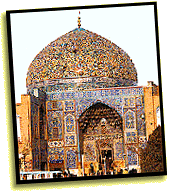 |
 |
 |
|
|||
|
Iran Postcard
A couple of months ago, in the ancient Persian capital of Isfahan, I arrived at the airport close to midnight, to catch the last plane back to Teheran. Tired and annoyed at myself for overpacking on a simple weekend jaunt, I was the picture of the American tinker. Bag straps crisscrossing my chest like bandoleers, a sweat-stained, leather-brilled Snake Eyes golfing cap pulled down over my forehead, I hung on for dear life to my new laptop computer. Not the best ambassador, surely, that the Great Satan could muster. To the waiting crews, women in black chadors and glowering bearded men, Iwas quite a curiosity, for it seemed as if they were all glowering at me. I took up the rear of the ticket line, and when I finally presented myself to the diminutive agent, he looked up. "Italian? German? he asked laconically. "No", I said, I'm an American." A huge smile crossed his face.. "Well," he said, leaning back in his chair to get a fuller look, "I haven't seen an American in Isfahan for twenty years!" He was eager to know everything about me. Where did I come from? What brought me to Isfahan? How did I like his city? When would I return? I have never felt quite so exotic in my life.
At least I settled myself and my ungainly bags into a few seats in the inner waiting room... and pulled out a book, my son's dog-eared copy of Arabian Nights. After a time my eye caught a glimpse of a small man coming into the waiting room and soon recognized my friendly ticket taker. He made a bead for me and presented me with two boxes of the famous Isfahan sugar and pistachio candy known as Gaz. I rose to accept the gift, for I was touched. He didn't say why he was presenting me with this token... but he didn't have to. I was simply that disheveled American who had made the effort to come all the way to Isfahan, and he was grateful. I can't remember if I told him I was a writer, but I wouldn't want to impute a cynical motive. It was as if I were the only American he would ever see, and he wanted to savor the moment. The last thing I needed was another thing to carry onto that plane. But I pressed his boxes somewhere under my upper arm and soldiered forward. I managed everything until half way up the mobile stairs, when everything started to give way. But I got some help from one of those formerly glowering men and made it onto the plane. When the stern-looking stewardess in her chador was looking the other way, I stashed my gift in the first empty niche I noticed, somewhere in the galley, and hurried to my seat like a naughty child. And then I remembered that question that you're routinely asked nowadays at most airports. Have you packed all your bags yourself? Has anyone given you anything? I had not been asked those questions in Isfahan. Naw... I banished the thought. That was truly a cultural contact between estranged peoples...wasn't it? I wanted to enjoy it. When I got off the plane in Teheran, a male steward ran after me. "I think you forgot this, sir?" he said. James Reston, Jr. is a writer and author of several books, including The Last Apocalyse: Europe in the year 1000 A.D.; The Lone Star; and Our Father Who Art in Hell: The Life and Death of the Rev. Jim Jones. Mr. Reston is also a playright and brodcaster. His many articles have appeared in such publications as Time, Newsweek, National Geographic, and The New Yorker. He lives in Chevy Chase, Maryland with his family.
|
 | American Public Media Home | Search | How to Listen ©2004 American Public Media | Terms of Use | Privacy Policy |
 Finally, I broke away and passed through security. This evoked a
different sort of surprise: the dim, the long forgotten memory of living
in a segregated society. Mine was the segregation in the Old South, the
south of separate water fountains and bathrooms and eating places based
on color. Here the segregation was by gender. Under the watchful eye of
the morals police, the women passed obediently through their separate
metal detectors and put their bags on separate conveyer belts. By this
time I had been in Iran for more than a week, but I knew that no matter
how long I stayed, I could never get used to this public separation.
Finally, I broke away and passed through security. This evoked a
different sort of surprise: the dim, the long forgotten memory of living
in a segregated society. Mine was the segregation in the Old South, the
south of separate water fountains and bathrooms and eating places based
on color. Here the segregation was by gender. Under the watchful eye of
the morals police, the women passed obediently through their separate
metal detectors and put their bags on separate conveyer belts. By this
time I had been in Iran for more than a week, but I knew that no matter
how long I stayed, I could never get used to this public separation.